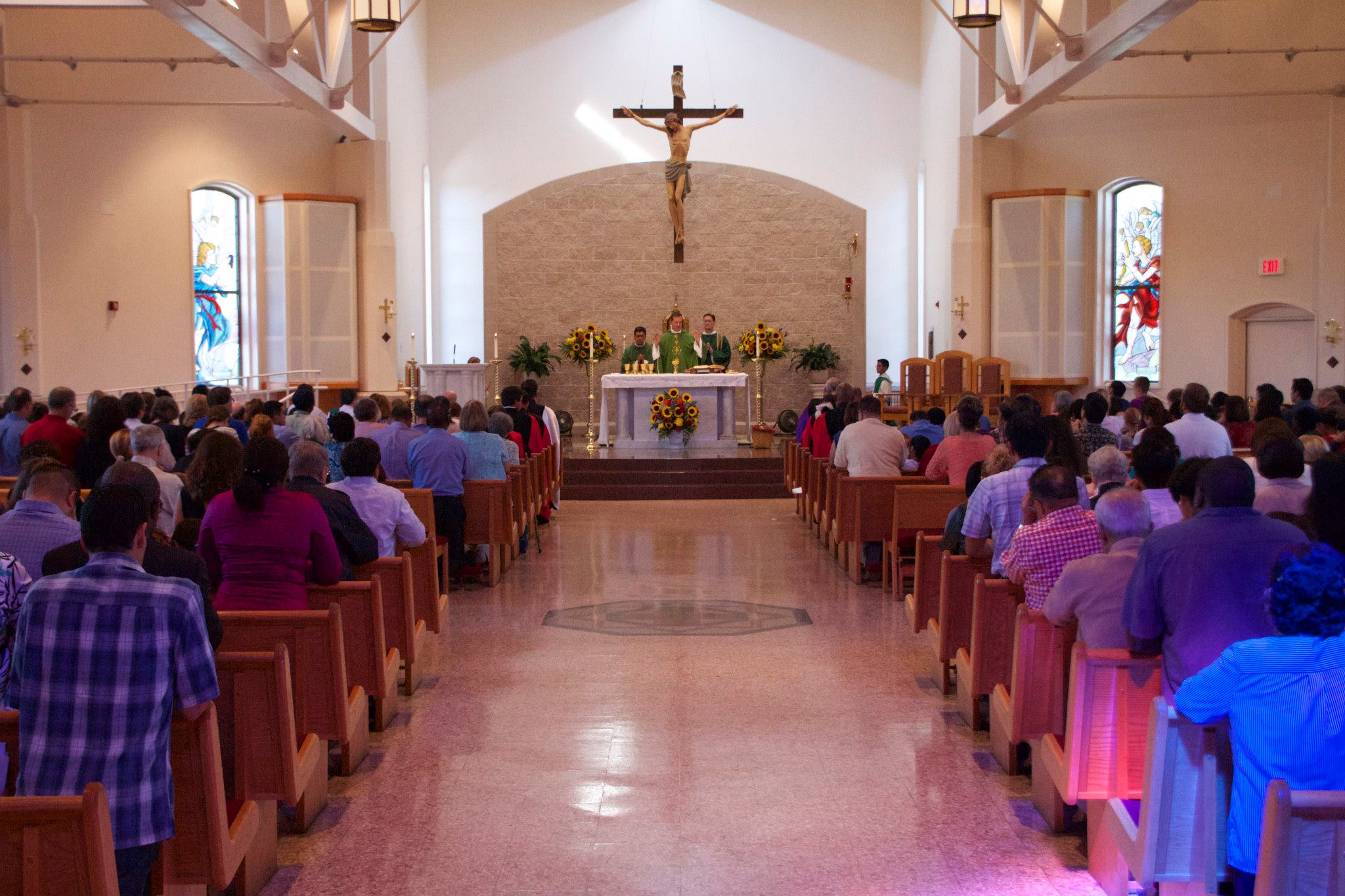Every 25 years the Church celebrates a Jubilee year to focus on the mercy and love of God and neighbor. Pope Francis inaugurated the Holy Year 2025 on Christmas Eve, opening the Holy Doors of St. Peter’s Basilica. The door is a symbol of the true door, Jesus Christ, through which we enter eternal and new life
Announcing the Ordinary Jubilee of 2025, the Holy Father says, “Now the time has come for a new Jubilee, when once more the Holy Door will be flung open to invite everyone to an intense experience of the love of God” (Spes non confundit, 6). He encourages the faithful to be Pilgrims of Hope in the quest for a renewed encounter with God’s love because “Hope does not disappoint” (Romans 5:5). The hope we have in Christ does not put anyone to shame because out of his love for us he gave up himself that we may receive mercy; and his mercy takes away our shame.
In this Holy Jubilee Year, the Holy Father urges all Christians, Pilgrims of Hope, to bring hope and be signs of hope to the elderly, the youth and young adult, the migrants, those imprisoned or enslaved, the sick and the poor, and to be mindful of the common environment we share. “We, however, by the virtue of the hope in which we are saved, can view the passage of time with the certainty that the history of humanity and our own individual history are not doomed to a dead end or a dark abyss, but directed to an encounter with the Lord of glory” (Spes non confundit, 19). As Pilgrims of Hope, we carry the message of a constant encounter with the crucified and risen Lord of glory to all peoples and to the ends of the earth.
This message of hope and encounter with the Lord of glory has been entrusted to the Church and her children. As the Church proclaims this message in this Jubilee Year, she, as the mystical body of the merciful Lord, opens the store house of mercy accessible to her to grant indulgence to those who devoutly seek the Lord by turning away from their sins.
What is an indulgence? The Catechism of the Catholic Church explains that “An indulgence is a remission before God of the temporal punishment due to sins whose guilt has already been forgiven, which the faithful Christian who is duly disposed gains under certain prescribed conditions through the action of the Church which, as the minister of redemption, dispenses and applies with authority the treasury of the satisfactions of Christ and the saints. An indulgence is partial or plenary according as it removes either part or all of the temporal punishment due to sin. The faithful can gain indulgences for themselves or apply them to the dead.” (CCC,1471). Sin carries punishment and guilt. Kind David, when he killed Uraiah and married his wife Bathsheba, was confronted for the sinful act by the prophet Nathan. David begged for forgiveness and Nathan told him that the Lord has forgiven his sins but as a punishment, the child born to him from the adulterous act will die. And so, it happened. (2 Samuel 11 and 12).
Indulgence is the removal of the punishment due to sin. The bride of Christ, the Church, which is also the body of Christ, is privileged to beg her Spouse and Head to remove the punishment due to sin of her members when they faithfully seek conversion and return to God, having met certain prescribed conditions. Through indulgence one encounters the God who is “rich in mercy” (Ephesians 2:4).
The Apostolic Penitentiary has issued the guideline for obtaining indulgence during the Jubilee of 2025. “All the faithful, who are truly repentant and free from any affection for sin, who are moved by a spirit of charity and who, during the Holy Year, purified through the sacrament of penance and refreshed by the Holy Communion, pray for the intentions of the Supreme Pontiff, will be able to obtain from the treasury of the Church a plenary indulgence, with remission and forgiveness of all their sins, which can be applied in suffrage to the souls in Purgatory.” (Decree on the granting of the indulgence during the ordinary jubilee year 2025 call by his Holiness Pope Francis)
Indulgence during the Jubilee can be obtained in the following ways according to the Apostolic Penitentiary:
- Make a Pilgrimage:
- To any sacred Jubilee site
- in Rome. At least one of these: St. Peter’s Basilica, St. John Lateran, St. Mary Major and St. Paul Outside the Walls.
- in the Holy Land. At least one of these: Basilica of the holy Sepulcher, Basilica of the Nativity and Basilica of the Annunciation.
- in other ecclesiastical areas designated by a local bishop.
- In the Archdiocese of Washington, some parishes will serve as Jubilee Parishes:
- In the Archdiocese of Washington, some parishes will serve as Jubilee Parishes:
- To any sacred Jubilee site
- Make a pious visit to sacred places:
- By participating in Eucharistic adoration and meditation, concluding with the Our Father, the Profession of Faith and invocations to Mary.
- in Rome: the Basilica of the Holy Cross in Jerusalem, the Basilica of St Lawrence at the Verano, the Basilica of St Sebastian, the Sanctuary of Divine Love, the Church of the Holy Spirit in Sassia, the Church of St Paul at the Tre Fontane, the Roman Catacombs; the churches of the Jubilee Pathways dedicated respectively to the Iter Europaeum and to the Female Patrons of Europe and Doctors of the Church (the Basilica of Santa Maria sopra Minerva, and the churches of St Brigid at Campo de’ Fiori, Santa Maria della Vittoria, Trinità dei Monti, the Basilica of Saint Cecilia in Trastevere, and the Basilica of St. Augustine in Campo Marzio.
- in other places in the world: the two Minor Papal Basilicas in Assisi – those of St Francis and Our Lady of the Angels; the Pontifical Basilicas of Our Lady of Loreto, Our Lady of Pompeii, and St Anthony in Padua; any minor basilica, cathedral church, co-cathedral church, Marian sanctuary (including Basilica of the National Shrine of the Immaculate Conception, Washington DC).
- By participating in Eucharistic adoration and meditation, concluding with the Our Father, the Profession of Faith and invocations to Mary.
- For those faithful who truly turn away from their sins but are not able to engage in pilgrimages, pious visits or other celebrations (especially the elderly, the sick, those imprisoned or healthcare workers), Jubilee Indulgence can be obtained “under the same conditions if united in spirit with the faithful taking part in person… they recite the Our Father, the Profession of Faith in any approved form, and other prayers in conformity with the objectives of the Holy Year, in their homes or wherever they are confined (e.g. in the chapel of the monastery, hospital, nursing home, prison…) offering up their sufferings or the hardships of their lives.”
- Works of mercy and penance
- The faithful can also gain indulgence is “they participate in popular missions, spiritual exercises, or formation activities on the documents of the Second Vatican Council and the Catechism of the Catholic Church, held in a church or other suitable place, according to the mind of the Holy Father.”
- “The faithful who have carried out an act of charity [corporal and spiritual works of mercy] on behalf of the souls in Purgatory, if they receive Holy Communion a second time that day, can obtain the plenary indulgence twice on the same day, applicable only to the deceased (this must take place within a Eucharistic celebration).” “The faithful will be able to obtain the Jubilee Indulgence if they visit, for an appropriate amount of time, their brothers and sisters who are in need or in difficulty (the sick, prisoners, lonely elderly people, disabled people…), in a sense making a pilgrimage to Christ present in them (cf. Mt 25, 34-36) according to the usual spiritual, sacramental and prayer conditions. The faithful can repeat these visits throughout the Holy Year, even daily, acquiring a plenary indulgence each time.”
- “The Jubilee Plenary Indulgence can also be obtained through initiatives that put into practice, in a concrete and generous way, the spirit of penance which is, in a sense, the soul of the Jubilee. In particular the penitential nature of Friday can be rediscovered through abstaining, in a spirit of penance, at least for one day of the week from futile distractions (real but also virtual distractions, for example, the use of the media and/or social networks), from superfluous consumption (for example by fasting or practicing abstinence according to the general norms of the Church and the indications of the Bishops), as well as by donating a proportionate sum of money to the poor; by supporting works of a religious or social nature, especially in support of the defense and protection of life in all its phases, but also by supporting the quality of life of abandoned children, young people in difficulty, the needy or lonely elderly people, or migrants from various countries “who leave their homelands behind in search of a better life for themselves and for their families” (Spes non confundit, 13); it can also be obtained by dedicating a reasonable portion of one’s free time to voluntary activities that are of service to the community or to other similar forms of personal commitment.”


